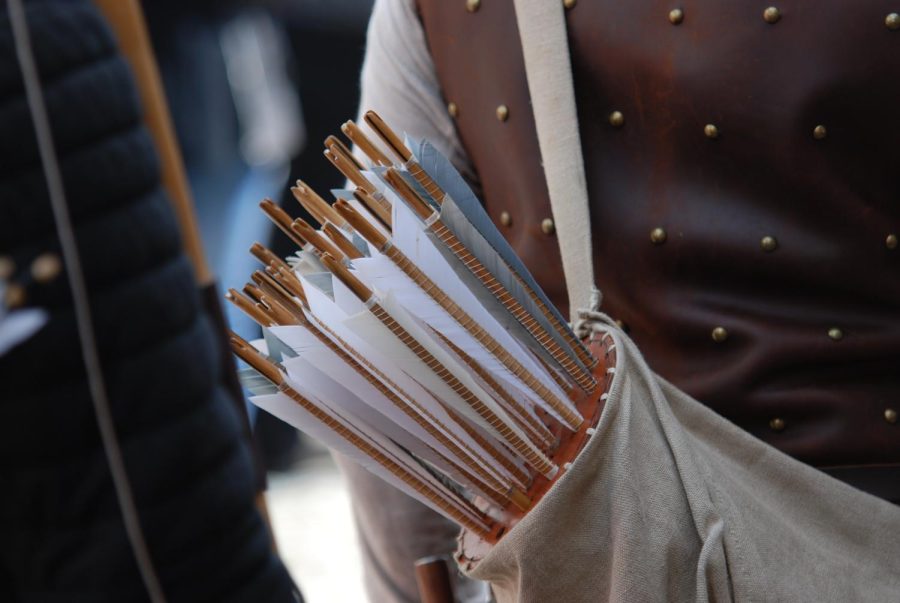REVIEW: The Hunger Games teaches readers the importance of democracy
Quivers like these are used often by Katniss throughout the novels. Photo by Paul Alnet on Unsplash
October 12, 2022
Suzanne Collins’ “The Hunger Games” is an action-filled, page turning pre-teen classic, but reflecting upon the trilogy, I found it succinctly commentates on our current democracy, how precarious it is and the dangers of a life without it.
The protagonist is Katniss Everdeen, a teenage girl living in a future dystopian version of the United States called Panem. Panem is divided into twelve districts, and while the Capitol and surrounding districts are wealthy and modern, Katniss lives in District 12, the poorest district. Formerly known as Appalachia, District 12 is defined by gray soot and hungry citizens. Katniss has to illegally hunt in the woods with her friend Gale just to support her mother and little sister, Prim.
The Hunger Games are an annual tradition instituted by the Capitol in order to suppress the districts and remind them of the Capitol’s absolute power. The districts must each send one female and male tribute to fight to the death as a form of entertainment for Capitol audiences.
In a shocking early twist, Katniss volunteers for tribute from District 12, sacrificing herself for her sister. The ideas of self-sacrifice, love and defying oppression build Katniss’ character and guide the plot of the entire trilogy.
Collins masterfully weaves the best of the romance, adventure and dystopian genres to create a masterful and addicting read. One moment contains a tender moment between Katniss and fellow tribute Peeta, while the next moment your heart is racing as Katniss and Peeta work to keep each other alive. Throughout the series, the reader becomes increasingly indignant towards the Capitol and its heinous actions against these kids and their districts.
The masterful weaving of some of my favorite genres kept me turning page after page, but what kept me coming back to the novel was its underlying political warning. Collins introduces a patronizing and oppressive fictional government, one that only retains control through fear-mongering. She describes a class divide that is so perverse, some are forced to hunt illegally for survival, while others drink vomit-inducing poison to eat again. Panem’s government and class divisions are not as foreign as we are initially led to believe. In our world, we have witnessed people instilling fear during the Capitol insurrection on January 6th, or during Jim Crow-era laws in the South. It is difficult to not find homeless people on the side of a developed road as the wealthy drive by on heated leather seats.
Early in the book, Peeta remarks that he doesn’t want to be another piece in the Capitol’s games. It takes Katniss until the final installment to truly realize what Peeta means–that their lives are owned by the government and they need to fight to get their autonomy back.
The main difference between Panem and modern-day America is Democracy. Although the leader of Panem uses the title of president, he rules as an absolute dictator. President Snow manipulates allies, kills enemies and terrorizes his citizens in order to keep power. In America, the cornerstone of democracy, the right to vote is threatened now more than ever. Voter suppression laws are popping up on state legislative floors, along with redlining and urban gentrification can feel as if they could have derived from Collins’ Panem too.
The Hunger Games warns us of the danger of leaving too much power in the hands of the few. The lessons of love and sacrifice that Katniss teaches us are important, but I believe it is the sacred nature of democracy that Collins really wants the reader to come away with. If we take it for granted, our own Hunger Games may soon be upon us.










Letty Leisy • Mar 15, 2025 at 3:07 pm
Im so glad that soon my son is going to get this book and even watch the movie at his school after Spring break. I as his mother have to encourage him to think critically about this topic, as a mother who was born under a tyrannical regime in Cuba which still manipulates its citizens at the island, without any rights and keep them living under extreme poverty and repression! No one knows what they are suffering inside of the country because Cuba is shut down from the international media